Installing PHP 7.3 - macOS
This documentation will cover how to install PHP 7.3 and ScriptCase manually on macOS. Performing this type of installation is your responsible for configuring your entire environment as well as database extensions.
Listed below are versions of macOS approved for use by Scriptcase.
Our supported versions:
- MacOS 12.0 “Monterey”
- MacOS 11.0 “Big Sur”
- macOS 10.15 “Catalina”
- macOS 10.14 “Mojave”
- macOS 10.13 “High Sierra”
- MacOS 10.12 “Sierra”
- MacOS 10.11 “El Capitan”
NOTE: If you want access our documentation about manual install of ScriptCase PHP 7.0 in MacOS, see through our knowledge base.
Requirements
WARNING: If you already have a Web Server with Apache and PHP 7.3 configured, just go to the IonCube configuration and proceed to manual installation.
To proceed with the installation, you need to download some files.
Required Files:
- IonCube Loader for OS X (x86 ou x64): Click here
- Scriptcase (.zip): Click here
NOTE: Before proceeding with the installation it is recommended not to have any other web environments (such as XAMP, Zend Server, etc.) installed on the operating system. Knowledge of Unix environment is recommended to use terminal.
PHP configuration
Listed below are the commands required for the manual installation of PHP 7.3 on macOS. Check the package naming on your macOS terminal correctly.
1 - You’ll need to install Homebrew to be able to access PHP 7.3 and other packages. Install Brew with the following commands in the macOS terminal:
/usr/bin/ruby -e "$(curl -fsSL https://raw.githubusercontent.com/Homebrew/install/master/install)"
2 - In the macOS terminal, execute brew update to update Brew.
3 - Use the command brew install php@7.3 for installing PHP 7.3.
4 - After the installation proccess completes, execute brew info php@7.3 to get the information that we need to proceed with environment setting up.
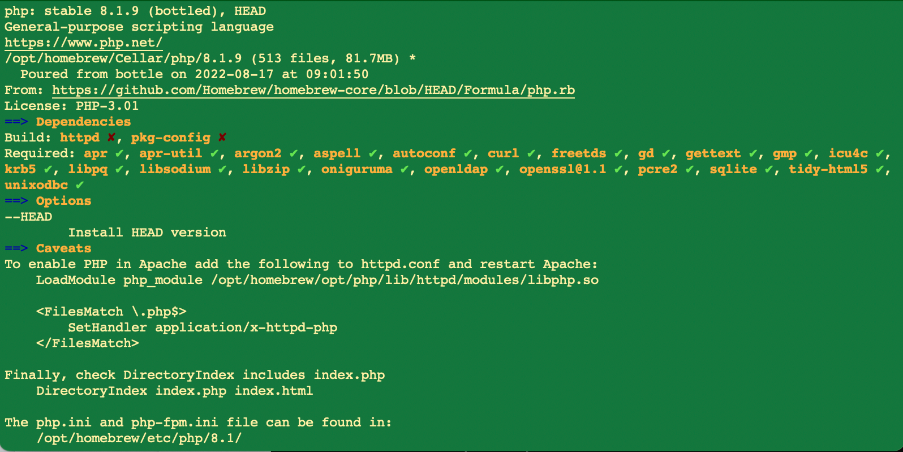
5 - You need to configure Apache so that PHP 7.3 that was installed in the previous steps will be used as default on your system.
- Edit the Apache file
httpd.confand comment out the path to the old PHP 7.3 module if present in the file. To comment, you need to add a#at the beginning of the line.
Exemple:
sudo nano /etc/apache2/httpd.conf
6 - Add path to PHP 7.3 module installed after last line LoadModule in httpd.conf.
Exemple:
LoadModule php7_module /usr/local/opt/php@7.3/lib/httpd/modules/libphp7.so
 `
`
After performing this action, save the file and restart the apache service..
sudo apachectl restart
7 - Add the path to the installation of PHP 7.3 in the ~ / .zshrc file with the following commands::
echo 'export PATH="/usr/local/opt/php@7.3/bin:$PATH"' >> ~/.zshrc echo 'export PATH="/usr/local/opt/php@7.3/sbin:$PATH"' >> ~/.zshrc
8 - Edit the file ~/.bash_profileand add PHP 7.3 path with these following commands:
echo 'export PATH="/usr/local/opt/php@7.3/bin:$PATH"'
9 - Verify PHP version by running command: php -v
Exemple:

10 - Access the php.ini file in the directory. /usr/local/etc/php/7.3/ and set the recommended minimum value correctly of these PHP directives listed below for Scriptcase work properly.
Search for the directives and assign the value according to this example:
max_execution_time = 3600max_input_time = 3600max_input_vars = 10000memory_limit = 1024Mpost_max_size = 1024Mupload_max_filesize = 1024Mmax_file_uploads = 200short_open_tag = On
11 - By default, PHP disables some functions that are important to Scriptcase. Click here to access the necessary functions list for ScriptCase
- Change item line disable_functions as example below:
disable_functions =
Exemple:

12 - Set PHP TimeZone according to your region. Use the value available in the PHP documentation. Searh for date.timezone in your php.ini file, uncomment it and edit according to the selected TimeZone.
Exemple:
date.timezone = America/Recife
13 - Set the folder where temporary files will be stored. search for ;session.save_path, uncoment it and inform your temporary folder path.
Exemple:
session.save_path = "/tmp"
14 - Save all modifications made and restart the Apache service using the following command in terminal:
sudo apachectl restart
15 - Verify changes made through the file info.php. You need to create this file and put it in the directory. /Library/WebServer/Documents/with the following content:
<?php
phpinfo();
?>
After that, check in your browser the page generated by accessing the URL 127.0.0.1/info.php.
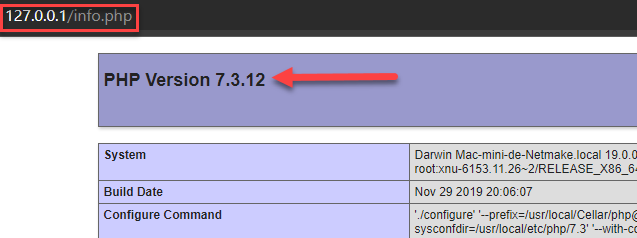
NOTE: For more information about the function phpinfo(), verify our PHP documentation.
Enable IonCube Loader
Before you start installing Scriptcase, you need to enable the loader responsible for encrypting Scriptcase in PHP. Follow the steps below to perform this action successfully.
1 - Go to the Downloads folder and extract the downloaded file for IonCube Loader at the beggining of this documentation start.
Exemple:
cd /Users/usuario/Downloads
sudo chmod 777 ioncube_loaders_dar_x86-64.zip && unzip ioncube_loaders_dar_x86-64.zip
cd ioncube
2 - Copy the file ioncube_loader_dar_7.3.so and paste it into your PHP extension_dir directory. We’ll use /usr/local/lib/php/pecl/20180731 for this example.
Exemple:
sudo cp ioncube_loader_dar_7.3.so /usr/local/lib/php/pecl/20180731
3 - Edit the php.ini file and below the last line enter the path to the extension within the parameter zend_extension:
Exemple:
sudo nano /usr/local/etc/php/7.3/php.ini
zend_extension = "/usr/local/lib/php/pecl/20180731/ioncube_loader_dar_7.3.so"
4 - Restart the Apache service with the following terminal command:
sudo apachectl restart
Manual ScriptCase installation
Listed below are the steps needed to do a Scriptcase manual installation. To do the steps, it is needed that you have a web server configured in your machine.
1 - Download the Scriptcase (.zip) directly from the download page from our website.
2 - Extract the .zip file and rename the extracted folder to scriptcase.
3 - Move the scriptcase to your server root. Depending of your operating system and the installation the path can be different from the example. However, by default the paths are:
| Windows | Server |
|---|---|
C:\Apache24\htdocs\ | Apache |
C:\inetpub\wwwroot\ | IIS |
| Linux | Server |
|---|---|
/var/www/html/ | Linux Local |
/home/$(whoami)/public_html/ | Linux Server |
| macOS | Server |
|---|---|
/Library/WebServer/Documents | Apache |
4 - Access the Scriptcase using your browser:
127.0.0.1/scriptcase
- By default the selected language is English.

5 - Check the extensions required for Scriptcase to function and database connection modules that are enabled.
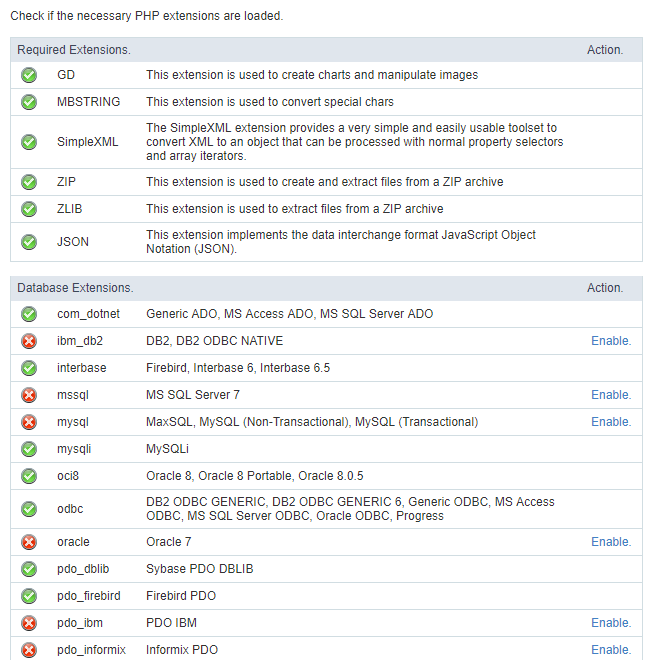
Typical installation
Check the steps below to complete the manual installation of Scriptcase in a typical way.
NOTE: By selecting this installation, Scriptcase will set your environment by default. Defining the installation database and the login user in Scriptcase.

After clicking proceed, you will be redirected to the Scriptcase Login page.
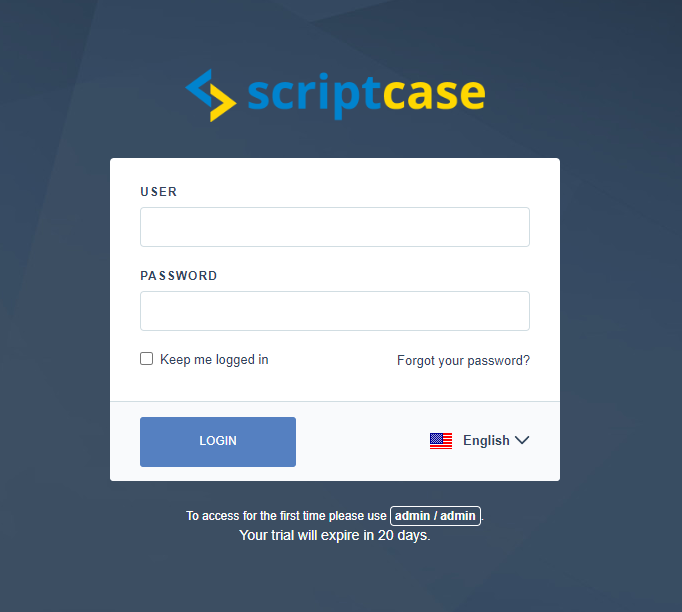
In this field, it is necessary to inform the user to login to Scriptcase. By default, the user is admin.
In this field, you must enter the password to login to Scriptcase. By default, the password is admin.
This option keeps the user logged in until they log out through the Scriptcase interface.
By clicking this option, it is possible to recover the password of the informed user. An email will be sent to the user in question so they can access the recovery steps.
Important: You can only perform password recovery if you have configured your SMTP information. To access our documentation showing how to perform this configuration click here.
Custom installation
Check the steps below to complete the manual installation of Scriptcase in a custom manner.
NOTE: By selecting this installation, you will be responsible for setting up your environment. Defining the installation database and the login user for Scriptcase.

1- Verify that the directories required by Scriptcase have the correct permissions. If any directory listed does not have the active check icon ![]() , correct permission for this directory.
, correct permission for this directory.
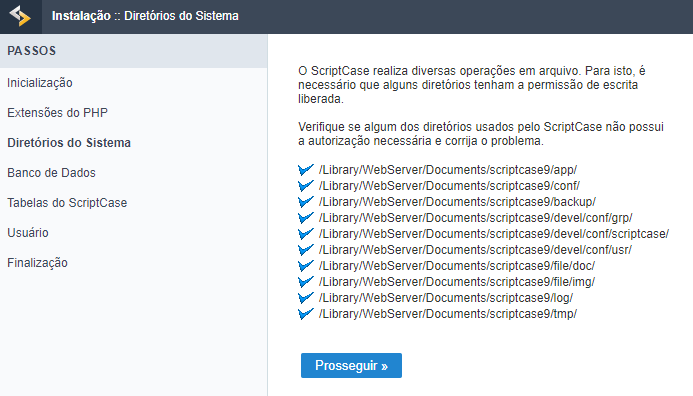
Clique em prosseguir para avançar no processo de instalação.
2- Choose the database where the Scriptcase database will be installed. By default, Scriptcase recommends that it be installed with the SQLite database.
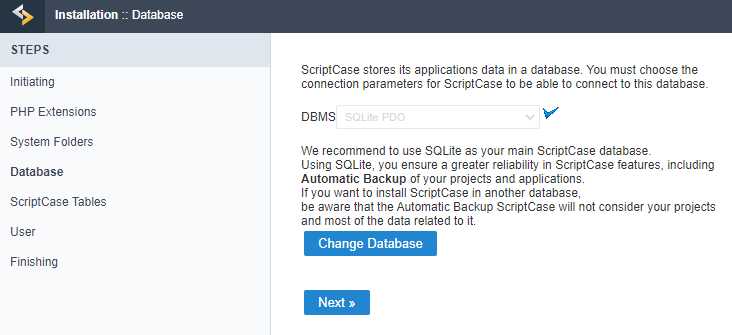
- You can change the default database by clicking the Change Database button. By clicking this option you will need to set the following options:
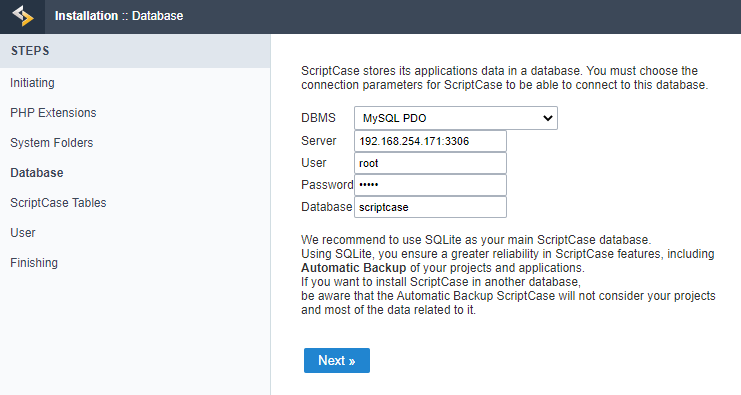
In this option, you will select the Driver to connect to your database.
In this option, you will inform the server to connect to the desired database.
You need to inform a user who has access to the database you want Scriptcase to be installed on.
You must enter the authentication password corresponding to the entered user.
You must enter the name of the database where Scriptcase will be installed.
Example:
scriptcase
Clique em prosseguir para avançar no processo de instalação.
3 - Verifique se a criação das tabelas da base de dados do Scriptcase ocorreu com sucesso. As tabelas serão marcadas com o ícone de sucesso ![]() na lateral.
na lateral.
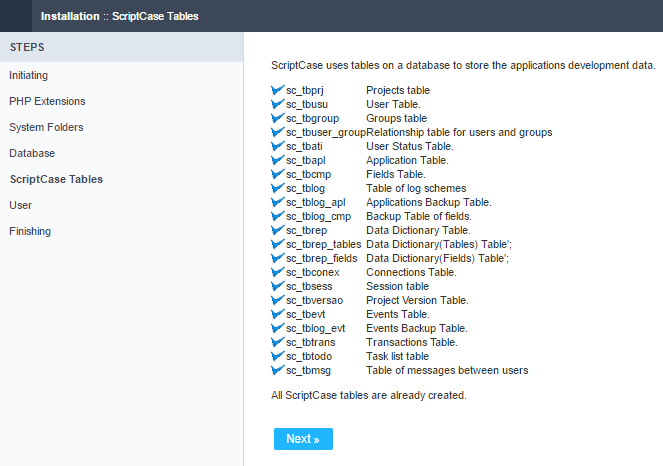
Click proceed to proceed with the installation process.
4 - Set the default user who will have access to Scriptcase.

In this option, you will enter the default Scriptcase User Login.
In this option, you must enter the password that will correspond to the user informed.
You must repeat the previously entered password for successful user creation.
Click proceed to proceed with the installation process.
5 - Complete Scriptcase custom installation on your web server.
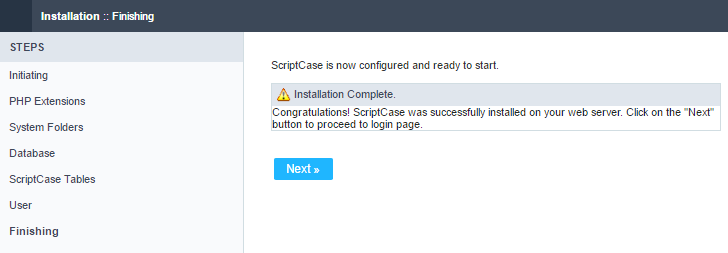
After clicking proceed, you will be redirected to the Scriptcase Login page.

In this field, it is necessary to inform the user to log in to Scriptcase. By default, the user is admin.
In this field, you must enter the password to log in to Scriptcase. By default, the password is admin.
This option keeps the user logged in until they log out through the Scriptcase interface.
By clicking this option, it is possible to recover the password of the informed user. An email will be sent to the user in question so they can access the recovery steps.
Important: You can only perform password recovery if you have configured your SMTP information. To access our documentation showing how to perform this configuration click here.
Related Articles
Installing PHP 8.1 - MacOS
This documentation will cover how installing PHP 8.1 and ScriptCase manually on macOS. Performing this type of installation is your responsible for configuring your entire environment as well as database extensions. Listed below are versions of macOS ...Installer for macOS - PHP 7.3
The Scriptcase installer installs Apache, PHP and Scriptcase on your operating system. The installer does not include a database Prerequisites To download the Scriptcase Installer, go to our download page clicking here. IMPORTANT: The Scriptcase ...Installing Scriptcase with PHP 8.1 no Windows
This documentation will walk you through the steps necessary to install PHP 8.1, Apache 2.4, and Scriptcase manually. When performing this type of installation, you are responsible for configuring your entire environment as well as database ...Installing Scriptcase with PHP 7.3 on Windows
This documentation will walk you through the steps necessary to install PHP 7.3, Apache 2.4, and Scriptcase manually. When performing this type of installation, you are responsible for configuring your entire environment as well as database ...Installing PHP 7.3 - Linux
his documentation will teach all the steps necessary for the installation of the PHP 7.0, Apache 2.4 and the Scriptcase using the manual installation in the Linux environment. Doing this kind of installation you will be responsible for configuring ...